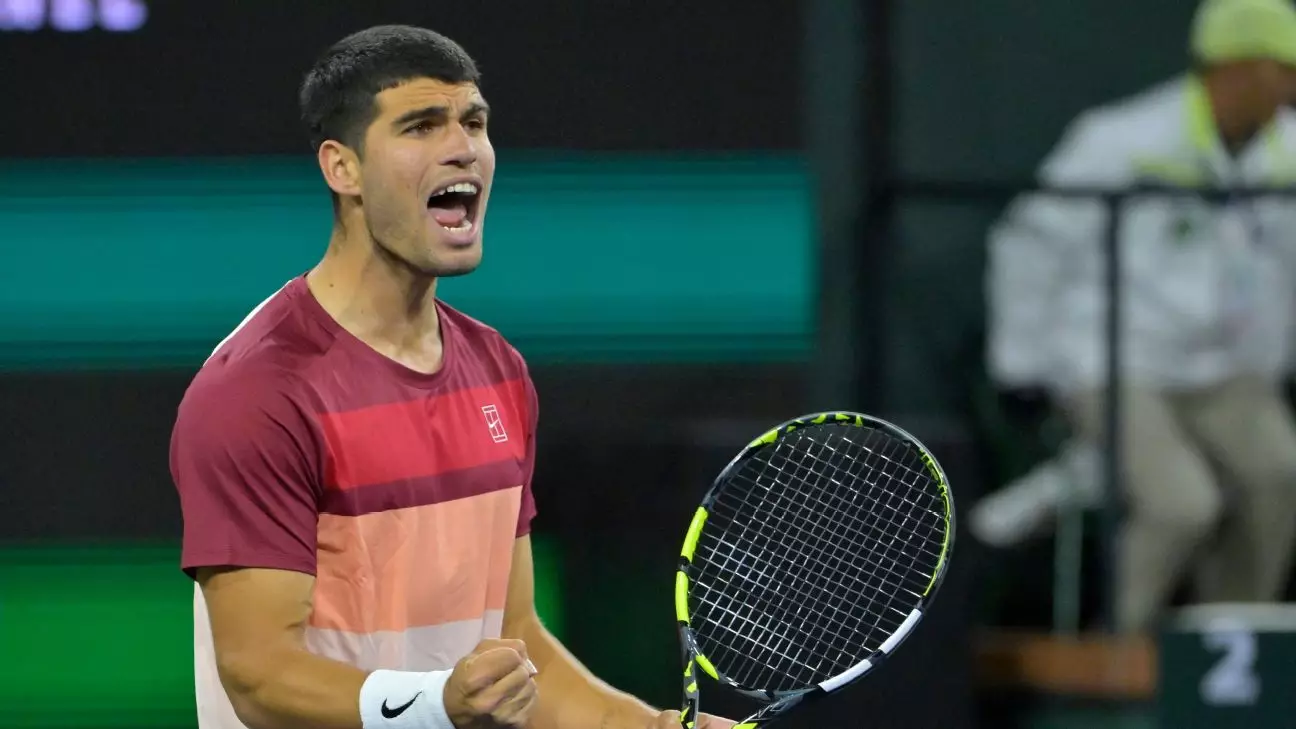In a gripping display of sportsmanship and grit, Carlos Alcaraz, the world’s third-ranked player, has once again shown his mettle by rallying back from a precarious position against Arthur Fils at the Monte Carlo Masters. The match, which lasted over two and a half hours, was not just a contest of physical skill but a test of mental fortitude. Alcaraz entered the match as the defending champion of the French Open, but he faced an uphill battle against Fils, who seemed poised to dispatch him with a strong start.
Alcaraz found himself on the brink of defeat at 3-1 in the final set. However, the young Spaniard’s ability to recover from these tense moments is what sets him apart from others in the sport. Key to his victory was his tactical prowess on clay, a surface where he thrives and one that he admitted he had missed. His ability to execute crucial shots under pressure, especially a stunning lob that allowed him to break Fils’ serve in the second set, emphasized his growing confidence. “I believe that true champions find the right level when necessary,” Alcaraz stated, reflecting a wisdom beyond his years. In an era when many players buckle under pressure, Alcaraz stands out as a beacon of resilience.
The Disappointment of Defending Champion Tsitsipas
On the other side of the coin, the tournament has been unforgiving for the defending champion, Stefanos Tsitsipas, who faced an unexpected exit at the hands of Lorenzo Musetti. Tsitsipas began the match like a whirlwind, winning the first set decisively at 6-1. Yet, the match took an alarming turn when his serve faltered dramatically. Losing confidence under pressure, Tsitsipas made a staggering number of unforced errors and double faults, ultimately leading to his downfall.
This stark juxtaposition between Alcaraz’s resilience and Tsitsipas’ unexpected collapse is telling. Tsitsipas spoke candidly about his frustration and heartbreak, expressing his disbelief at losing a match where he felt completely in control. The emotional toll of such disappointments cannot be understated; victories often hinge not just on skill, but also on mental fortitude. Tsitsipas’ struggle to maintain composure, especially after losing the last two sets 6-3, 6-4, raises questions about the psychological aspect of high-stakes tennis.
The Rise of Young Talent
Musetti’s win over Tsitsipas signals the rise of young talent in the ATP circuit, marking a shift that could signify a new generation of contenders ready to challenge the existing order. Musetti’s emotional reaction post-match—a display of tears after earning his place in the semifinals—speaks to the passion and dedication that define emerging athletes. His excitement paired with the feeling of measurement against a player like Tsitsipas beautifully encapsulates the unpredictability of the sport.
Beyond Musetti, Alex de Minaur’s seamless victory over Grigor Dimitrov, where he won 6-0, 6-0 in a mere 44 minutes, is another testament to the potency of fresh talent breaking into the scene. Dimitrov’s performance, marred by a staggering 23 unforced errors, adds a layer of complexity to these matches; it emphasizes that in tennis, mental lapses can be as pivotal as physical prowess.
A Shift in the Competitive Landscape
The cascading results from the Monte Carlo Masters reveal a dynamic shift in the competitive landscape of men’s tennis. With young players stepping up and established champions encountering unexpected hurdles, the narrative surrounding these athletes is evolving. The pressure that comes from being a top seed and defending champion can be overwhelming, and the acknowledgment of such pressure, as seen in both Alcaraz’s triumph and Tsitsipas’ downfall, lends depth to the on-court storylines.
In the context of preparing for larger tournaments like the French Open, these matches serve as crucial learning experiences. Alcaraz’s triumph offers hope and promise for the future of tennis, showcasing that skill and determination conquer adversity. Meanwhile, Tsitsipas’ exit serves as a reminder that even champions are subject to the whims of fate and the complexities of the game. The Monte Carlo Masters thus stands as a microcosm of the evolving tennis narrative, marked by resilience, growth, and the indomitable spirit necessary to thrive in the high-pressure world of professional sports.

